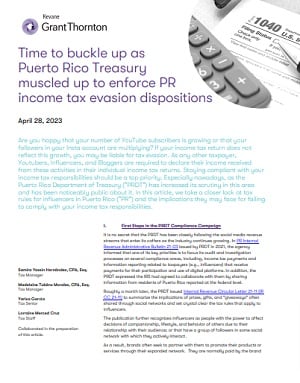-
Financial statements audits
Financial statement audits
-
Compliance audits
Compliance audits
-
Compilations and reviews
Compilations and audit
-
Agreed-upon procedures
Agreed-upon procedures
-
Corporate and business tax
Our trusted teams can prepare corporate tax files and ruling requests, support you with deferrals, accounting procedures and legitimate tax benefits.
-
International tax
Our teams have in-depth knowledge of the relationship between domestic and international tax laws.
-
Tax compliance
Business Tax
-
Individual taxes
Individual taxes
-
Estate and succession planning
Estate and succession planning
-
Global mobility services
Through our global organisation of member firms, we support both companies and individuals, providing insightful solutions to minimise the tax burden for both parties.
-
Sales and use tax and indirect taxes
SUT/ VAT & indirect taxes
-
Tax incentives program
Tax incentives program
-
Transfer Pricing Study
The laws surrounding transfer pricing are becoming ever more complex, as tax affairs of multinational companies are facing scrutiny from media, regulators and the public

-
Business consulting
Our business consulting services can help you improve your operational performance and productivity, adding value throughout your growth life cycle.
-
Forensic and investigative services
At Grant Thornton, we have a wealth of knowledge in forensic services and can support you with issues such as dispute resolution, fraud and insurance claims.
-
Fraud and investigations
The commercial landscape is changing fast. An ever more regulated environment means organizations today must adopt stringent governance and compliance processes. As business has become global, organizations need to adapt to deal with multi-jurisdictional investigations, litigation, and dispute resolution, address the threat of cyber-attack and at the same time protect the organization’s value.
-
Dispute resolutions
Our independent experts are experienced in advising on civil and criminal matters involving contract breaches, partnership disputes, auditor negligence, shareholder disputes and company valuations, disputes for corporates, the public sector and individuals. We act in all forms of dispute resolution, including litigation, arbitration, and mediation.
-
Business risk services
We can help you identify, understand and manage potential risks to safeguard your business and comply with regulatory requirements.
-
Internal audit
We work with our clients to assess their corporate level risk, identify areas of greatest risk and develop appropriate work plans and audit programs to mitigate these risks.
-
Service organization reports
As a service organization, you know how important it is to produce a report for your customers and their auditors that instills confidence and enhances their trust in your services. Grant Thornton Advisory professionals can help you determine which report(s) will satisfy your customers’ needs and provide relevant information to your customers and customers’ auditors that will be a business benefit to you.
-
Transactional advisory services
Transactions are significant events in the life of a business – a successful deal that can have a lasting impact on the future shape of the organizations involved. Because the stakes are high for both buyers and sellers, experience, determination and pragmatism are required to bring deals safely through to conclusion.
-
Mergers and acquisitions
Globalization and company growth ambitions are driving an increase in M&A activity worldwide as businesses look to establish a footprint in countries beyond their own. Even within their own regions, many businesses feel the pressure to acquire in order to establish a strategic presence in new markets, such as those being created by rapid technological innovation.
-
Valuations
We can support you throughout the transaction process – helping achieve the best possible outcome at the point of the transaction and in the longer term.
-
Recovery and reorganization
We provide a wide range of services to recovery and reorganisation professionals, companies and their stakeholders.

Are you happy that your number of YouTube subscribers is growing or that your followers in your Insta account are multiplying? If your income tax return does not reflect this growth, you may be liable for tax evasion. As any other taxpayer, Youtubers, Influencers, and Bloggers are required to declare their income received from these activities in their individual income tax returns. Staying compliant with your income tax responsibilities should be a top priority. Especially nowadays, as the Puerto Rico Department of Treasury (“PRDT”) has increased its scrutiny in this area and has been noticeably public about it. In this article, we take a closer look at tax rules for influencers in Puerto Rico (“PR”) and the implications they may face for failing to comply with your income tax responsibilities.
I. First Steps in the PRDT Compliance Campaign
It is no secret that the PRDT has been closely following the social media revenue streams that enter its coffers as the industry continues growing. In PR Internal Revenue Administrative Bulletin 21-03 issued by PRDT in 2021, the agency informed that one of its key priorities is to focus its audit and investigation processes on several compliance areas, including, income tax payments and information reporting related to taxpayers (e.g., influencers) that receive payments for their participation and use of digital platforms. In addition, the PRDT expressed the IRS had agreed to collaborate with them by sharing information from residents of Puerto Rico reported at the federal level.
Roughly a month later, the PRDT issued Internal Revenue Circular Letter 21-11 (IR CC 21-11) to summarize the implications of prizes, gifts, and "giveaways" often shared through social networks and set crystal clear the tax rules that apply to influencers.
The publication further recognizes influencers as people with the power to affect decisions of companionship, lifestyle, and behavior of others due to their relationship with their audience; or that have a group of followers in some social network with which they actively interact.
As a result, brands often seek to partner with them to promote their products or services through their expanded network. They are normally paid by the brand as independent contractors and might receive informative returns such as Form 480.6A, Form 480.6SP, or Form 1099-MISC reporting their income. They may also be considered merchants for purposes of the Sales and Use Tax, and thus be required to apply for a Merchant Registry.
Common reportable income streams from social media include:
1. Sponsored posts: brand hires an influencer to create content with the brand and share it with their followers. If a product is gifted as part of the sponsorship the market value of the product must be reported as income.
2. Digital products: commission on the sale of e-books, promotional brochures, or co-creation of content with brands. Influencers can sell such e-books to their followers or receive payment from the brand for each click or download.
3. Sale of advertising space: A brand rents space from the influencer to promote a product through a click ad or an advertising article.
4. Webinars and podcasts: Influencers can charge consumers to access content, collaborate with a brand to produce content, or use the format for lead generation.
The publication also emphasizes that if the brand offers a paid stay to the influencer, the value of such stay must be reported as taxable income as well.
On a related note, the PRDT states that giveaways are, as a general rule [1], gifts reported and taxed at market value on the tax year the winner won the prize. These gifts are taxable since they require actionable steps from the giveaway participants to be won (i.e., share content, tag followers). This holds true regardless of whether the prize was in cash, in kind, or an experience (for example, paid vacations). Additionally, the person or entity awarding it must report the giveaway on Form 480.6A- Informative Statement- Other Income Not Subject to Withholding ("Form 480.6A") when the value of the gift is greater than $500. Please note that to deduct the expense of the prize, the sponsor must file the form even if the value is less than $500.
II. Further Criminal Enforcements
The PRDT’s increased oversight aims to tackle the growing tax evasion and fraud cases by influencers on the Island and has begun enforcing tax evasion mechanisms as displayed through the media outlet in 2022. One of the recent cases of tax evasion is from an influencer and speaker who pled guilty to four charges for failing to report $11 million in his income tax returns for the years 2017 to 2022. Another YouTuber who allegedly failed to report millions of dollars in his income tax return and filed false and fraudulent returns with the PRDT has been charged and awaits the judicial process. The Secretary of the PRDT (“the Secretary”), Mr. Francisco Parés Alicea highlighted this case as one of the most sophisticated cases of tax evasion seen in Puerto Rico.
We will dive into mechanisms available in PR to penalize and prosecute taxpayers that engage in tax evasion and/or tax fraud. [2] We will also look at different variants of tax evasion and navigate through the monetary penalties and imprisonment charges imposed by the Puerto Rico Internal Revenue Code (“PRIRC”).
The PRIRC imposes a combination of penalties and criminal charges on taxpayers violating its income tax dispositions. In the section below, we mention some of them.
III. Summary of Administrative Penalties and Criminal Charges
Failure to submit information or pay tax
If you intentionally fail to comply with your obligation to pay, file any return or keep records and information you may be subject to penalties, additions to tax or imprisonment. This failure to comply could be cataloged either as a misdemeanor (which is subject to a fine not more than $5,000 dollars or imprisonment for a term of not more than 90 days, or both) or a felony (which is subject to imprisonment for 8 years and or a penalty of not more than $20,000 dollars). Through a recent amendment, the Secretary must now certify the amount due on such regards.
Fraudulent filings
If you willfully deliver to the Secretary, fraudulent returns, statements, information, documents or assist in the preparation or presentation of these with the knowledge that are false, you may be charged with a felony in the third degree.
Failure to collect taxes or make required withholdings at source
If you are a principal operating officer, president, principal accounting officer, comptroller and any official in a similar position of an entity or person and you are responsible to collect and pay the sales and use tax or withholding tax at source, and willfully and knowingly fail to collect them, you can be subject to a fixed penalty of 3 years of imprisonment.
Failure to file an information return
If you willfully procure, counsel, incite, and conspire for your own benefit or the benefit of a financial entity or brokerage business, with or without its authorization, and the business omits to file the information return, you may be charged with a felony in the third degree.
Failure to pay or deposit income tax on wages
If you fail to pay or deposit income tax on wages, you are exposed to a penalty from 25% to 50% of the amount not reported, unless you demonstrate to the PRDT’s satisfaction that the cause of failing to comply was due to circumstances beyond your control. For repeated offenders, the penalty can increase to 100%.
Failure to pay estimated tax or underpaying it
If you fail to timely pay or make an incomplete payment of an installment of the estimated tax, you may be subject to an addition of 10% percent to the tax of the unpaid amount.
IV. Statute of Limitations
For how long are you at risk?
It depends on the case. As a rule of thumb, the period of limitation upon assessments is 4 years after the return was filed. This means that generally, after the expiration date of the limitation period, no processes in court can be initiated without an assessment for the collection of taxes (collection proceedings with an assessment can be initiated). However, certain exceptions apply. For example, if you omitted from gross income an amount that exceeds 25% of the gross income reported in the return, the tax may be assessed and collection processes in court may begin without assessment at any time within 6 years after the return was filed. The same 6-year rule will apply if you omit from gross sales or purchases an amount that exceeds 25% of the gross income reported in the Monthly Sales and Use Tax return.
The PRIRC lists certain exceptions to the statute of limitation where the tax may be assessed and collected at any time or over an expanded period of time under special rules. Some of these exceptions are:
• False or fraudulent returns or statements with the intention
to evade taxes
• Failing to file a return
• Property gifted or received from an estate having an inconsistent basis valuation for income tax purposes versus for estate or gift tax purposes
• When the assessment of any income has been made within the statute of limitation
• Deficiencies in the gain upon a sale or exchange of residence
• Voluntary waiver
As mentioned above, the PRDT has implemented strategies and investigations for the compliance of tax matters related to the income reporting of influencers, youtubers and content creators. It is paramount to be aware of all the requirements discussed and take action as needed in order to comply and prevent any penalties, fines or imprisonment.
We continue with our commitment to keeping you up to date with these tax-related developments. We will be glad to assist you and serve all your PR tax compliance needs to ensure you do not fall into one of these processes. In addition, we can run a compliance check-up to identify exposure areas and address them before they fall into the hands of the PRDT. We also support taxpayers in the voluntary disclosure processes with the Puerto Rico Department of Treasury. Please contact our Tax Department should you require additional information regarding this or any other tax issue.
Collaborated in the preparation of this article: Yarixa García, Tax Senior & Lorraine Merced Cruz, Tax Staff
[1] Certain academic or professional prizes may be excluded from gross income if they meet specific criteria.
[2] Note that there is a difference between tax evasion and tax avoidance. Tax evasion is intentionally concealing income from tax authorities, while tax avoidance is legally reducing your taxable income. Our discussion focuses on tax evasion and fraud.
DISCLAIMER: This update and its content do not constitute advice. Clients should not act solely on the basis of the material contained in this publication. It is intended for information purposes only and should not be regarded as specific advice. In addition, advice from proper consultant should be obtained prior to taking action on any issue dealt with this update. Information provided in this publication may change in the future
and such change may be applied retroactively. Kevane Grant Thornton LLP does not assume the responsibility
to update this communication if the applicable laws change.
© 2023 Kevane Grant Thornton LLP All rights reserved. Kevane Grant Thornton LLP is a member firm of Grant Thornton International Ltd (GTIL). GTIL and the member firms are not a worldwide partnership. Services are delivered by the member firms. GTIL and its member firms are not agents of, and do not obligate, one another and are not liable for one another’s acts or omissions. Please visit www.grantthornton.pr for further details


